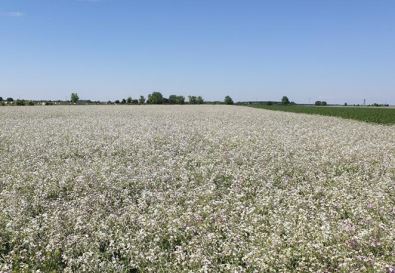Bezenye Agricultural Cooperative
Success Story
The agricultural company cultivates an area of 393.3 ha. The crops grown on their land are: winter wheat, grass (8 ha), alfalfa, winter barley, buckwheat (as a secondary crop), phacelia - also used as multifunctional field margins.
They carry out organic farming and the crops are cultivated in an environmentally friendly way using minimum tillage. Soil moisture loss is reduced by mulching, and green manure is applied to maintain and promote beneficial biological activities in the soil. In addition, it cultivates secondary crops (e.g. buckwheat) and maintains 8 ha of grassland. The backbone of nutrient replenishment is the use of foliar fertilisation and biostimulants.
Applying the practices of RA is considered to be the most beneficial from the point of view of environmental protection, and this type of farming is also an advantage in meeting consumers’ expectations for a more environmentally conscious approach. The difficulty they need to face is that there has been a reduction in yields, which slows down the returns, and that the more severe controls by the organic certification impose a greater administrative burden on the producer.
LABELS: Hungary, crop-production, organic
|
GENERAL INFORMATION |
|
Location of farm |
Hungary, Bezenye |
|
Name of the farmer |
Dr. Tóth Kálmán |
|
Size of farm |
393,3 ha |
|
Permanent staff |
3 |
|
Main products of farm |
Wheat, grassland (8 ha), alfalfa, winter barley, pohanka (Successive secondary crop) |
|
CURRENT REGENERATIVE AGRICULTURE PRACTICES ON THE FARM |
|
Farmland cultivated with RA practices |
All |
|
Crops produced with RA practices |
Wheat, alfalfa, winter barley, pohanka |
|
Duration of using RA practices |
Since 2012 |
Read more information in pdf...

The REGINA project (No. 2021-1-HU01-KA220-HED-000027629) was funded by the European Commission. The content of this website does not necessarily reflect the views of the European Commission.
Call 2021, KA220 – Cooperation Partnerships in Higher Education
The European Commission’s support for the production of the publications does not constitute an endorsement of the contents, which reflect the views only of the authors, and the Commission cannot be held responsible for any use which may be made of the information contained therein.


